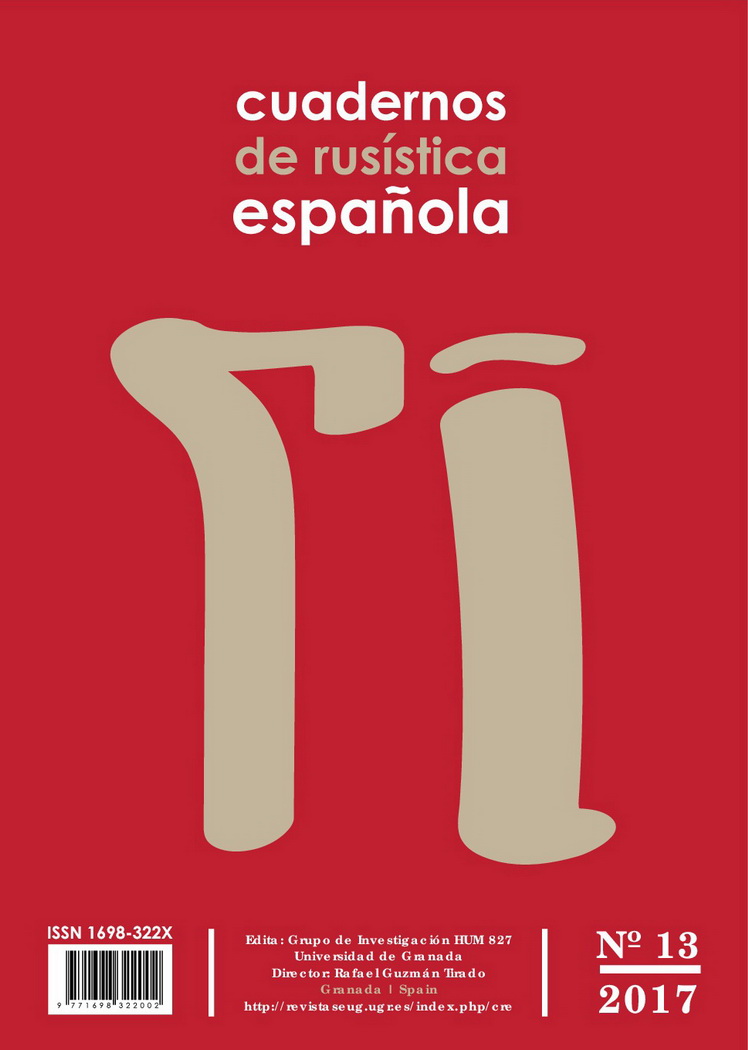Русская народная культура в зеркале словообразования
DOI:
https://doi.org/10.30827/cre.v13i0.6397Palabras clave:
Ключевые слова, диалектное словообразование, фрагменты гнезд, когнитивные лакуны.Resumen
В статье рассматриваются возможные аспекты использования когнитивно значимых и заслуживающих внимания в культурно-историческом плане фактов русского диалектного словообразования в практике преподавания русского языка как иностранного. Автор статьи убежден в том, что в процессе преподавания русского языка иностранцам вполне возможно привлечение к анализу таких производных диалектных слов, которые сами по себе, либо в совокупности целой группы родственных единиц могут представлять чрезвычайно интересный, поучительный и во многих отношениях познавательный материал для «вхождения» в русский язык, русскую материальную и духовную культуру. При рассмотрении особого внимания заслуживают слова с когнитивно значимой семантикой, представляющие значения, отсутствующие в виде отдельного слова в системе литературного языка. Целесообразно, по мысли автора, рассматривать подобные слова не изолированно, а в составе различных фрагментов лексико-словообразовательных гнезд. Последние могут состоять как целиком из диалектных слов, так и представлять собой фрагменты синтезированного типа, в которых слова русского литературного языка и диалектные единицы рассматриваются в составе единой группы родственных слов.
Descargas
Citas
APRESYAN, U.D. (1986): «Dejksis v leksike i grammatike i naivnaya model' mira», Semiotika i informatika. Moskva, s. 5 – 33.
EVGEN’EVA, A.P. (1981 – 1984): Slovar' russkogo jazyka. Akademija nauk SSSR, In-t russkogo jazyka. Moskva.
NIKITEVICH, A.V. (2012): «Derivacionnye ob#edinenija v sostave dialektnyh podsistem blizkorodstvennyh jazykov», Tvorba rechi i њeni resursi u slovenskim jezicima: Zbornik radova sa chetrnaeste meђunarodne nauchne konferencije Komisije za tvorbu rechi pri Meђunarodnom komitetu slavista, s. 235 – 243.
MILOSLAVSKIJ, I.G. (2010): «Rol' slovoobrazovaniya v rasshirenii kognitivnogo prostranstva russkogo yazyka, v Vіdobrazhennya іstorіі ta kul'turi narodu v slovotvorennі», Dopovіdі uchasnikіv HII Mіzhnarodnoї navukovoї konferencії Komіsії zі slov’yans'kogo slovotvorennya pri Mіzhnarodnomu komіtetі slavіstіv. Kiїv, s.176 – 180.
NIKITEVICH, A. V. (2014): Derivacija i smysl. Grodnenskij gosudarstvennyj universitet imeni Janki Kupaly. Grodno.
Slovar' russkih narodnyh govorov (1965 – 2013). Izd-vo Akademii nauk SSSR, Institut lingv. Issledovanij RAN. Moskva – Sankt-Peterburg.
Slovar' sovremennogo russkogo literaturnogo jazyka (1950 – 1965). Akademija nauk SSSR, Institut russkogo jazyka. Moskva.
TIKHONOV, A.N. (1985): Slovoobrazovatel'nyj slovar'. Moskva.
SHABROVA, E.N. (2002): Dialektnoe kornevoe gnezdo: problemy i principy opisaniya: Uchebnoe posobie k speckursu. Sankt-Peterburg, Vologda.
VENDINA, T.I. (1998): Russkaya yazykovaya kartina mira skvoz' prizmu slovoobrazovaniya (makrokosm). Moskva.












